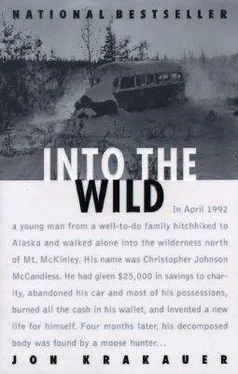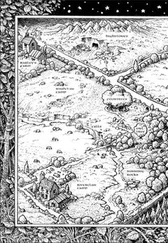Lori Zarza, the second assistant manager, has a somewhat different impression of McCandless. “Frankly, I was surprised he ever got hired,” she says. “He could do the job-he cooked in the back-but he always worked at the same slow pace, even during the lunch rush, no matter how much you’d get on him to hurry it up. Customers would be stacked ten-deep at the counter, and he wouldn’t understand why I was on his case. He just didn’t make the connection. It was like he was off in his own universe.
“He was reliable, though, a body that showed up every day, so they didn’t dare fire him. They only paid four twenty-five an hour, and with all the casinos right across the river starting people at six twenty-five, well, it was hard to keep bodies behind the counter.
“I don’t think he ever hung out with any of the employees after work or anything. When he talked, he was always going on about trees and nature and weird stuff like that. We all thought he was missing a few screws.
“When Chris finally quit,” Zarza admits, “it was probably because of me. When he first started working, he was homeless, and he’d show up for work smelling bad. It wasn’t up to McDonald’s standards to come in smelling the way he did. So finally they delegated me to tell him that he needed to take a bath more often. Ever since I told him, there was a clash between us. And then the other employees-they were just trying to be nice-they started asking him if he needed some soap or anything. That made him mad-you could tell. But he never showed it outright. About three weeks later, he just walked out the door and quit.”
McCandless had tried to disguise the fact that he was a drifter living out of a backpack: He told his fellow employees that he lived across the river in Laughlin. Whenever they offered him a ride home after work, he made excuses and politely declined. In fact, during his first several weeks in Bullhead, McCandless camped out in the desert at the edge of town; then he started squatting in a vacant mobile home. The latter arrangement, he explained in a letter to Jan Burres, “came about this way:”
One morning I was shaving in a restroom when an old man came in, and observing me, asked me if I was “sleeping out.” I told him yes, and it turned out that he had this old trailer I could stay in for free. The only problem is that he doesn’t really own it. Some absentee owners are merely letting him live on their land here, in another little trailer he stays in. So I kind of have to keep things toned down and stay out of sight, because he isn’t supposed to have anybody over here. It’s really quite a good deal, though, for the inside of the trailer is nice, it’s a house trailer, furnished, with some of the electric sockets working and a lot of living space. The only drawback is this old guy, whose name is Charlie, is something of a lunatic and it’s rather difficult to get along with him sometimes.
Charlie still lives at the same address, in a small teardrop-shaped camping trailer sheathed in rust-pocked tin, without plumbing or electricity, tucked behind the much larger blue-and-white mobile home where McCandless slept. Denuded mountains are visible to the west, towering sternly above the rooftops
of adjacent double-wides. A baby-blue Ford Torino rests on blocks in the unkempt yard, weeds sprouting from its engine compartment. The ammonia reek of human urine rises from a nearby oleander hedge.
“Chris? Chris?” Charlie barks, scanning porous memory banks. “Oh yeah, him. Yeah, yeah, I remember him, sure.” Charlie, dressed in a sweatshirt and khaki work pants, is a frail, nervous man with rheumy eyes and a growth of white stubble across his chin. By his recollection McCandless stayed in the trailer about a month.
“Nice guy, yeah, a pretty nice guy,” Charlie reports. “Didn’t like to be around too many people, though. Temperamental. He meant good, but I think he had a lot of complexes-know what I’m saying? Liked to read books by that Alaska guy, Jack London. Never said much. He’d get moody, wouldn’t like to be bothered. Seemed like a kid who was looking for something, looking for something, just didn’t know what it was. I was like that once, but then I realized what I was looking for: Money! Ha! Ha hyah, hooh boy!
“But like I was saying, Alaska-yeah, he talked about going to Alaska. Maybe to find whatever it was he was looking for. Nice guy, seemed like one, anyway. Had a lot of complexes sometimes, though. Had ‘em bad. When he left, was around Christmas I think, he gave me fifty bucks and a pack of cigarettes for lettin’ him stay here. Thought that was mighty decent of him.”
In late November, McCandless sent a postcard to Jan Burres in care of a post-office box in Niland, a small town in California’s Imperial Valley. “That card we got in Niland was the first letter from him in a long time that had a return address on it,” Burres remembers. “So I immediately wrote back and said we’d come see him the next weekend in Bullhead, which wasn’t that far from where we were.”
McCandless was thrilled to hear from Jan. “I am so glad to find you both alive and sound,” he exclaimed in a letter dated December 9, 1991.
Thanks so much for the Christmas card. It’s nice to be thought of this time of year… I’m so excited to hear that you will be coming to see me, you’re welcome anytime.It’s really great to think that after almost a year and a half we shall be meeting again.
He closed the letter by drawing a map and giving detailed directions for finding the trailer on Bullhead City’s Baseline Road.
Four days after receiving this letter, however, as Jan and her boyfriend, Bob, were preparing to drive up for the visit, Burres returned to their campsite one evening to find “a big backpack leaning against our van. I recognized it as Alex’s. Our little dog, Sunni, sniffed him out before I did. She’d liked Alex, but I was surprised she remembered him. When the dog found him, she went nuts.” McCandless explained to Burres that he’d grown tired of Bullhead, tired of punching a clock, tired of the “plastic people” he worked with, and decided to get the hell out of town.
Jan and Bob were staying three miles outside of Niland, at a place the locals call the Slabs, an old navy air base that had been abandoned and razed, leaving a grid of empty concrete foundations scattered far and wide across the desert. Come November, as the weather turns cold across the rest of the country, some five thousand snowbirds and drifters and sundry vagabonds congregate in this otherworldly setting to live on the cheap under the sun. The Slabs functions as the seasonal capital of a teeming itinerant society-a tolerant, rubber-tired culture comprising the retired, the exiled, the destitute, the perpetually unemployed. Its constituents are men and women and children of all ages, folks on the dodge from collection agencies, relationships gone sour, the law or the IRS, Ohio winters, the middle-class grind.
When McCandless arrived at the Slabs, a huge flea market-swap meet was in full swing out in the desert. Burres, as one of the vendors, had set up some folding tables displaying cheap, mostly secondhand goods for sale, and McCandless volunteered to oversee her large inventory of used paperback books.
“He helped me a lot,” Burres acknowledges. “He watched the table when I needed to leave, categorized all the books, made a lot of sales. He seemed to get a real kick out of it. Alex was big on the classics: Dickens, H. G. Wells, Mark Twain, Jack London.
London was his favorite. He’d try to convince every snowbird who walked by that they should read Call of the Wild.”
McCandless had been infatuated with London since childhood. London’s fervent condemnation of capitalist society, his glorification of the primordial world, his championing of the great unwashed-all of it mirrored McCandless’s passions. Mesmerized by London’s turgid portrayal of life in Alaska and the Yukon, McCandless read and reread The Call of the Wild, White Fang, “To Build a Fire,” “An Odyssey of the North,” “The Wit of Porportuk.” He was so enthralled by these tales, however, that he seemed to forget they were works of fiction, constructions of the imagination that had more to do with London’s romantic sensibilities than with the actualities of life in the subarctic wilderness. McCandless conveniently overlooked the fact that London himself had spent just a single winter in the North and that he’d died by his own hand on his California estate at the age of forty, a fatuous drunk, obese and pathetic, maintaining a sedentary existence that bore scant resemblance to the ideals he espoused in print.
Читать дальше












